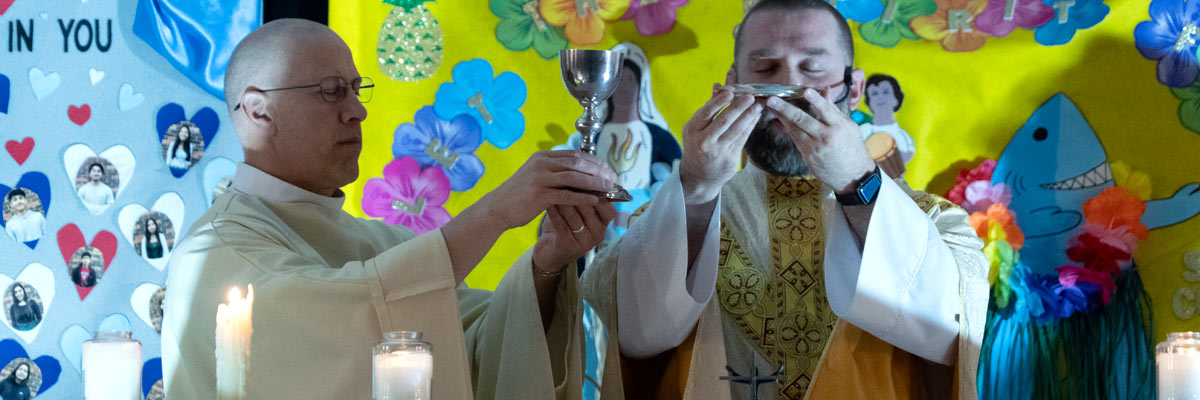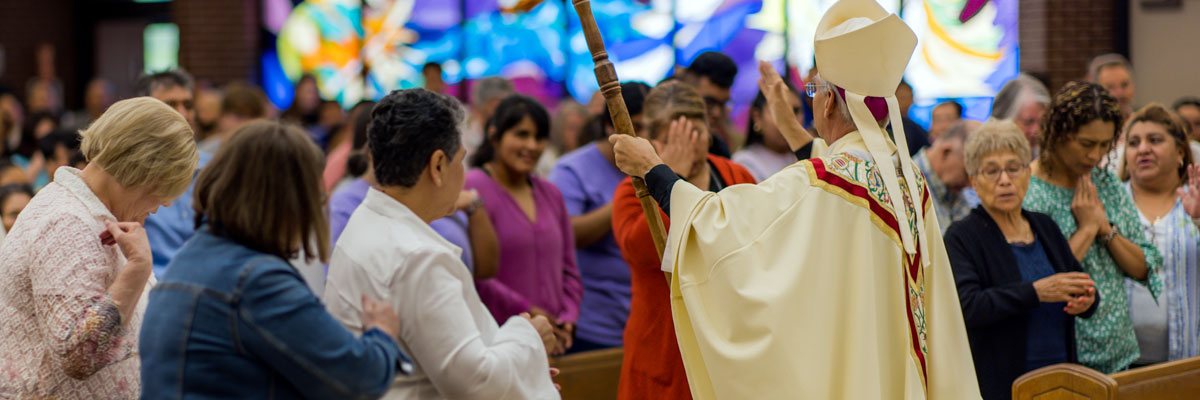Official Website of the
Catholic Diocese of Little Rock
24th Sunday in Ordinary Time, Year B
Published: September 13, 2015
Bishop Anthony B. Taylor preached the following homily at Christ the King Church in Little Rock and St. Thomas Aquinas University Parish in Fayetteville on Sunday, Sept. 13, 2015.

Bishop Taylor
One of the books that I read 30 years ago that did me a world of good was M. Scott Peck's “The Road Less Traveled.” I don't necessarily agree with everything in this work of pop-psychology, but one thought that has stayed with me is the importance of embracing legitimate suffering and the distortions that occur in our lives otherwise, when we try to avoid suffering — that is, when embracing that suffering is the price of faithfulness.
For instance, your parents probably didn't much like having to discipline you when you were little. It takes a lot of patience to be a good parent, but that is the price of faithful parenting, and if your parents had not made sacrifices to benefit you, you'd be a mess today. And as we grow up we realize that the same thing applies to the moral life.
There are certain activities and behaviors that we should do because we know they are right and others that we should avoid because we know they are wrong. It takes self-sacrifice to be a virtuous person, but that is the price of being true to ourself and to God. There are difficult things in life and that suffering, which is the price of faithfulness, when freely embraced, can be redemptive, in part because it forces us to live for something bigger than ourselves, true to the best that is in us.
Throughout the Gospels Jesus indicates that his way is the road less traveled that leads to salvation.
Throughout the Gospels Jesus indicates that his way is the road less traveled that leads to salvation. Indeed, early Christians called the Church "The Way" — and so those who truly follow Jesus are — of necessity — traveling down that same road less traveled that he did, otherwise we're not really following him. In today's Gospel, Jesus declares that he "will suffer greatly and be rejected by the elders, the chief priests and the scribes, and be killed, and rise after three days."
When Peter tries to talk him out of taking this path, which will lead to unspeakable suffering, Jesus says: "Get behind me, Satan. You are thinking not as God does but as humans do ... Whoever wishes to come after me must deny himself, take up his cross and follow me." This is the way that leads to salvation.
Peter and the other apostles did just that. They left everything and followed Jesus down that road less traveled all the way to Jerusalem, but we all know what happened there. In a moment of weakness, when their faithfulness was put to the greatest test, they stumbled. They fled. They sinned. And then they felt great remorse.
Peter denied him three times and then when the cock crowed, the enormity of what he had done came crashing down on him and he wept bitter tears. But then three days later, what happened? Jesus appeared to them risen from the dead. He said, "Peace be with you." He forgave them and then he sent them forth to continue along that same road less traveled in order to bring the Good News of salvation to others until that day when they would embrace the ultimate suffering of a martyr's death.
You and I have experienced this same dynamic in our own lives. We try to follow Jesus down the road less traveled with all the best of intentions. And then when put to the test, we fail. Those who struggle with addictions can be especially vulnerable and the consequences can be very destructive.
We see this with great clarity these days in the case of addiction to pornography, which has become an epidemic in our society — now twisting the minds of women, as well as men, and reprogramming the brains even of highly vulnerable and impressionable early adolescents. And there are a million other ways that we stumble and fall too, after which we also feel great remorse. Or at least we should feel remorse, like Peter who wept bitter tears.
But the story doesn't end there. The Lord is very merciful. To us also he says, "Peace be with you!" He forgives us and empowers us for a fresh start, a new beginning for a life of integrity and virtue. And then he sends us forth along his road less traveled to bring the Good News of salvation to others.









